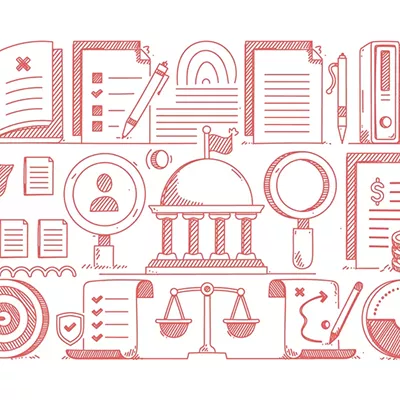Artificial intelligence has rapidly transformed various sectors, from health care and finance to transportation and entertainment. As AI technologies become increasingly sophisticated and pervasive, they present unique challenges and opportunities for the legal field.
Most people probably don't realize it, but the state of Illinois has taken a leading role in establishing artificial intelligence policies. For example, way back in 2008, the Biometric Information Privacy Act was enacted. Perhaps you remember it being at issue in a class action suit against Facebook for its use of facial recognition software.
Biometric data involves the measurement of a person's unique characteristics such as fingerprints, palmprints, voiceprints or facial, retinal or iris measurements. These markers are then used as unique identifiers and cannot be changed, unlike things like social security numbers. The Biometric Information Privacy Act limits how entities can collect this information and was ahead of its time in anticipating the challenges of AI.
Already, litigants are using BIPA to challenge certain uses of AI. For example, a lawsuit was recently filed claiming that OpenAI and Microsoft violated BIPA by illegally collecting facial markers and using that data to train its generative AI image creator. Other suits have been filed under BIPA challenging employers' use of voice-recognition technology in violation of this Illinois law. Both cases resulted in large class action settlements.
Moreover, the Illinois Supreme Court recently ruled that BIPA claims accrue each time there is a violation of the statute. In that case, White Castle was accused of violating BIPA each time an employee clocked in with a fingerprint scanner without the BIPA protections. Given that BIPA provides for $1,000 in damages for each violation, the use of AI in violation of BIPA could result in judgments in the billions of dollars. Oh – and the court also held that claims can go back as far as five years.
The Illinois Supreme Court also decided to weigh in on technology and attorney ethics. In 2016 it adopted the ethical duty of technology competence, becoming the 15th state to do so. The rule now states that every attorney has a duty to "maintain the requisite knowledge and skill, a lawyer should keep abreast of changes in the law and its practice, including the benefits and risks associated with relevant technology, engage in continuing study and education and comply with all continuing legal education requirements to which the lawyer is subject."
Illinois has recently been active in establishing other AI limits. In 2023, AI and the ever-evolving cyber-landscape drove Illinois to enact two laws addressing sexual deepfakes. The first law established a cause of action for individuals who have been the victim of non-consensual deepfake dissemination. A second law was passed that added AI deepfakes to the Illinois Nonconsensual Dissemination of Private Sexual Images Act. It's now been made clear that it applies to generative AI media as well as digital alterations.
Two bills that were passed by the House and Senate were sent to the governor in June. The first strengthens the protections Illinois law provides creators from having their likeness or voices generated by AI and then disseminated without their permission. Once signed, Illinois will be the second state to beef up its laws in this regard. The second bill clarifies that AI-generated child pornography is illegal.
Illinois was again at the forefront in 2020 as the first state to enact a law addressing the use of AI in the hiring process. The Artificial Intelligence Video Interview Act was passed in response to employers' increasing use of AI to monitor applicants' facial expressions, word choices, body language, etc. to find the best candidates, as well as their use of AI to evaluate resumes, social media presence and test results. Under this law, employers must: (a) inform candidates that AI technology will be used to evaluate interviews, (b) provide them with a written explanation of the process, including traits to be analyzed and the algorithms and characteristics that will be used, and (c) obtain the candidate's prior consent to the use of AI.
Another law was enacted in 2023 that established the Generative AI and Natural Language Processing Task Force. Among other things, this group is charged with the development of best AI practices with respect to (a) the protection of consumer information, (b) the use of AI in schools, for public services and in the workplace, (c) protecting civil liberties and (d) cybersecurity. The Department of Innovation and Technology is leading the effort, which will include five public meetings before a report must come out before the end of this year.
As AI technologies continue to advance, they will undoubtedly bring about further legal and ethical challenges. Policymakers, legal professionals and technologists must work together to navigate this complex landscape, ensuring that AI is developed and deployed in ways that are fair, transparent and accountable.
The interplay between AI and the law presents a unique set of challenges and opportunities in which Illinois has been at the forefront. Effective regulatory frameworks, ethical considerations and innovative legal practices are crucial in ensuring that AI technologies are used responsibly and beneficially. As we move forward, it is imperative that we strike a balance between fostering innovation and protecting the rights and interests of individuals and society as a whole.














